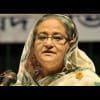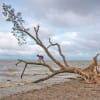A testing time ahead for humanity

The key findings of the recently released 2023-2024 Global Risks Report of the World Economic Forum are indeed concerning. The report identified extreme weather and AI-generated misinformation and disinformation as the two biggest risks facing the world in 2024. As one of the most climate-vulnerable countries, and one that frequently suffers from misinformation and propaganda, Bangladesh has its job cut out for it: it must make room for improvements on both fronts.
Last year's Global Risks Report was accurate in identifying a cost-of-living crisis to be the number-one predicament facing the world. But it is quite telling that, in the latest report, this has been knocked down to fourth position, while extreme weather has moved up from being in second place. What does this mean for Bangladesh? Considering the frequent climate events we faced in recent years, this can indeed be a big headache, so the authorities must prepare accordingly. Besides ramping up efforts to combat flooding and cyclones including strengthening flood embankments and shelters, it is crucial that the government invests more in early warning systems, as recommended by experts. Robust warning systems can minimise the damage of dangerous climate events.
As for the second-biggest global risk, while the WEF report categorises misinformation and disinformation as a technological threat, its impacts, if unchecked, can be felt across societies. Nearly half of the world's population will go into national elections this year. Not only will this amplify prevailing cyber insecurities, it will give reason to autocratic powers to increase surveillance under the guise of fighting mis- and disinformation. It will be up to democratic institutions to stay vigilant and fight off mis/disinformation campaigns, including from state powers, to stop manipulation of ordinary citizens.
In the face of increasing global challenges, what we need desperately is unity among citizens, among democratic institutions, and among nations. We—citizens and the media—must band together to demand justice, democracy, and accountability of state institutions so that they can play their role better to weather the crises facing us.

 For all latest news, follow The Daily Star's Google News channel.
For all latest news, follow The Daily Star's Google News channel. 








Comments